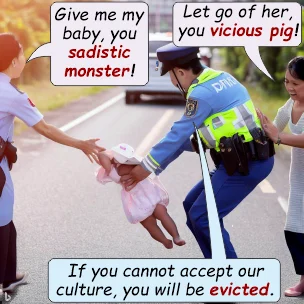Existing cultures have two standards of behavior
All of the existing
cultures could be described as having two standards
of behavior. The businesses, militaries, orchestras, and other organizations have one standard for
their members, which is very high, and the government has another standard for
the public, which is extremely low.
For example, none of the employees in a business worry about the other
employees
burglarizing or spraying graffiti
in their office or cubicle. They do not worry about homeless people or
illegal immigrants living in the hallways or bathrooms, and they do not
feel a need to have a dog or gun for protection. Although some of the
female employees are pestered by obnoxious men, none of
them worry that they will be punched
as they walk around the hallways.

The environment of most businesses is noticeably more peaceful and
pleasant than it is outside
the business. The reason is because the people
inside the building are higher quality
than those outside.
|
When we enter a business, it
can feel as if we are passing through a portal into a
peaceful world, and when we exit
the business, it can feel as if we are passing through a portal into a
miserable, frightening, dystopian society.
Some people remain at their job longer than they need to in order to
wait for traffic problems to decrease.
Some people are in no rush to get home because their city is so
miserable, and rarely has a social or recreational activity that they
are interested in. The primary social activities in most American
cities seems to be religious activities, drinking alcohol, extremely
loud music, gambling, and strip clubs.
The reason most businesses have a more pleasant environment is simply
because they set higher standards
for behavior for their employees than the nations are setting for the
citizens, and because the businesses evict
people who cannot meet the standards. For example, businesses would
evict an
employee who behaved like this
woman, who vandalized a retail store, but the US government allows
people like her to live among us, vandalize our property, and abuse us.
Instead of removing badly
behaved people, our governments protect them
to such an extent that
people are afraid to stop them
from abusing us, which is why nobody
tried to stop the woman in that video.
The standards
of behavior in China are so low that the Chinese people are afraid to
provide assistance to a
stranger.
Every culture has such low standards of behavior for citizens that some
of citizens have committed hundreds
of crimes.
There is no limit to how many crimes a person can commit. The Guinness
book of world records claims
that an Australian has set the record of about 3000 arrests.
The reason every culture is tolerant of bad behavior is because
every culture believes that every person is a wonderful creation of a
supreme being, and that we are all "equal" to on another. Every culture
believes that bad behavior is the result of poverty, bad parenting, or
something other than the genetic characteristics of the person, and
that bad behavior can be cured with punishments or therapy.
The attitude that criminals are wonderful people is so extreme that a
man in Italy who
killed two criminals was sentenced by the Italian courts to 17
years in prison, and ordered to pay €480,000 to the families of the
criminals.
The Behavior Ministry sets only
one, high standard of
behavior
This constitution changes
the situation dramatically by giving the
Behavior Ministry the authority and responsibility to set only one standard
of behavior for both the public
and the members of
organizations.
The Behavior Ministry must set standards that are so high that they
create a city in which nobody is afraid of other people, and no parent
feels the need to teach their children to be afraid of strangers.
Nobody should worry about becoming a victim of a bad tempered man,
lunatic, or pedophile network. There should not be any crime networks,
not even a teenage gang. Women should not even have to worry about lewd
remarks, and children should be able to trust the adults, including the
adult men.
Example #1: Citizens
cannot abuse
items
Businesses do not allow
their employees to abuse the equipment, furniture, computers, or other
items that belong to the business, and the Behavior Ministry is
required to set the same standards for citizens.
All existing cultures allow citizens to be irresponsible and abusive
with items, such as picking up items in retail stores and abandoning
them wherever they
please, even if it results in the destruction of the item, such as when
they put a frozen item in a location where it thaws and deteriorates.
The
citizens are also allowed to pick up and try on clothing items, and
abandon them wherever they please. People are even allowed to sit on
and destroy food items ( photo
below).
|
|
If the woman in the photo to
the right woman was an employee of a business, and if she was
destroying items in the business, she would risk being fired.
However, the standards of behavior for the public are so low that
people can get away with a lot of abusive
and destructive behavior.
Some extreme examples are these shoplifters,
and this
man who boasted about his abusive behavior "going viral" on the
Internet.
|
|

|
Every culture has such a
strong desire to protect badly behaved people that police hide the
identity of children who commit crimes, and journalists frequently hide
the identity of badly behaved adults, such as blurring faces, as in the
photo above.
In a prehistoric, nomadic tribe, everybody knew who was behaving badly,
including badly behaved children, but today we give the badly behaved
people so much secrecy that they can hide their bad behavior from their
friends, neighbors, potential spouse, and potential employer.
This constitution gives everybody free access to all material wealth
and facilities, and all of the material items will be high quality,
which means that they will be expensive. Therefore, the Behavior
Ministry must ensure that everybody is responsible with public
property. As the sharing
document describes, it would be impractical
to share material wealth and public facilities when some members of
society are irresponsible and destructive. We must set high
standards in order to share the wealth. This requires eliminating secrecy so that we can
determine who is badly behaved.
Another reason for setting
higher standards for the public is to reduce the number of undesirable
chores.
Nobody wants to spend their life picking up litter, scraping chewing
gum off of sidewalks or restaurant tables, cleaning graffiti off of the
walls, or putting foods or clothing back in their proper location of
the retail
store.
Example #2: False confessions
are crimes
This constitution makes a
distinction between two different types of false confessions:
|
1) |
Voluntary false confessions.
The voluntary false confessions are when a person tells the police, a
friend, a teacher, or somebody else that he committed a crime. There
have been a variety of reasons that people have done this. One reason
is to impress or intimidate other people. Another reason is because
some people are so stupid or mentally ill that they do it to become the
center of attention, or because they believe that they committed the
crime. There have also been people who confessed to a crime in order to
protect their spouse or child from being arrested for the crime. There
have even been a few criminals in jail who were so stupid that they
thought they could benefit by admitting to some other crime.
The voluntary false confessions waste the time and resources of the
police departments. In the USA, the people who make the false
confessions are rarely arrested, but this Constitution regards them as
dirt in a transmission, and must be evicted.
|
|
2)
|
Coerced false confessions.
The coerced false confessions are when a person being interrogated by
the police admits to a crime that he did not commit.
Some people have investigated those coerced confessions, and their
conclusion was that the people most likely to make a coerced confession
were those who were young, stupid, or mentally ill. This is another
reason why we must raise standards of behavior for the public. The
stupid and mentally ill people are troublesome in a lot of ways. They
are analogous to broken gears in a transmission.
One of the sad reasons that some people falsely confess to crimes is
the same reason that many women don't bother to call the police about
an abusive boyfriend or husband. Specifically, they have no faith that
the police or courts will protect them. So some people admit to a crime
they didn't commit in the hope of receiving a less brutal punishment.
Many people today realize that torture cannot
cause a person to tell the truth, but we are still following the belief
that brutal
interrogations can make people tell the truth. Although it is
necessary for the police to interview both witnesses and suspects, the
best way to solve and reduce crimes is to alter our culture so that
there is more emphasis on having undeniable evidence and less of a need
for witnesses and confessions.
Therefore, this Constitution authorizes the government to collect
security video from around the city, collect everybody's DNA, and use
tracking and facial recognition software to provide evidence that
cannot be disputed. |
False accusations are much
more common than false confessions, and they interfere with police
investigations just as much as the false confessions.
One reason that some people make false accusations is because they are
angry with somebody and want to get revenge on him, and so they contact
the police and claim that he might have committed the crime that they
are investigating. Although they undoubtedly realize that he will not
be convicted of the crime, they enjoy the thought that he will be
irritated by the police.
Another reason people make false accusations is to fool the police into
investigating innocent people so that the criminals have more time to
eliminate evidence and confuse the witnesses.
The USA, the people who make false accusations are rarely arrested.
Most are treated as citizens who made a mistake. However, this
constitution regards them as dirt in a transmission. They must be
investigated to determine whether they truly made a mistake, and if the
court determines that they did it on purpose, they must be evicted.
To complicate the issue of false accusations, this constitution regards
a lot of the remarks that people make as being false accusations. For
example, every culture allows us to refer to a person as a Holocaust
denier, racist, sexist, or anti-Semite. Those remarks are considered to
be "descriptions" of a person, but this constitution regard them as
false accusations.
Those remarks are intended to hurt a person's image; ie, his "social
credit score". They are intended to deceive us into disliking or hating
somebody. The Courts Ministry is required to regard unsupported
accusations as being just as illegal as accusing a person of rape or
murder without evidence of the crime. We will have a much more pleasant
social environment when we don't have to live among people who try to
stimulate our anger and hatred of the people that they dislike.
Leaders need the most scrutiny
As discussed in other
documents, such as here, instead
of setting high standards for people in leadership positions, we do the
exact opposite. Specifically,
we are submissive to people
above us in the hierarchy.
Every culture encourages such extreme submissiveness to the leaders of
government, religious organizations, think
tanks, charities, sports groups, and other organizations that there is
no concern for whether they are senile, blackmailed puppets of Israel,
or suffering from brain
damage. Also, no culture cares if a person gets into a leadership
position through crime, inheritances, divorce settlements, or winning
a lottery.
This constitution changes the situation dramatically by
requiring the Behavior Ministry to require the people in influential
positions to meet the same high standards as everybody else. However,
the people in the influential positions must get more scrutiny, and we must be more intolerant of their bad
behavior. We could describe the increased scrutiny as "setting higher
standards for our leaders". Leadership is regarded as a difficult job, not as entertainment.
The Behavior Ministry must investigate bad behavior
Many of us have done
something idiotic or inappropriate because of ignorance or
mistakes, so we cannot assume that a person who
behaved in a inappropriate manner did so deliberately.
When the Behavior Ministry notices that somebody
has behaved inappropriately, they must react by investigating the situation to
determine why
the
person behaved in that manner. Their investigation is not to determine
whether the person should be punished. Rather, it is to determine
whether they can reduce the problem from occurring in the future.
They should react to the bad behavior just like a farmer reacts to
undesirable behavior of his animals. For example, if a farmer notices
that a cow is out of his field, he does not punish the
cow. Instead, he investigates to determine if other cows are also out
of the field, and he investigates to figure out how they got out, and
he looks for a way to reduce such problems in the future.
The goal of the Behavior Ministry is to improve our social environment.
When they discover that somebody is behaving badly, they first need to
determine whether a lot of other people are behaving in the same
undesirable manner. If so, then the problem could be due to our
culture, rather than "bad behavior".
An example of a cultural problem
that encourages bad behavior was described in the dystopia document here in
which so many people ignored the paths ( in the photo
below) that they
created an ugly dirt path in the grass.

In that case, the Behavior
Ministry should conclude that they can eliminate that problem by
redesigning the paths.
Another example of how changing culture can reduce bad behavior is that
we should be able to reduce complaints of women of sexual harassment at
their jobs by prohibiting them from dressing in sexually attractive
clothing while they are working. Another option is to separate the male
and female employees who don't need to work near one another, such as
putting them on different floors of an office building, or different
areas of a factory.
If an investigation of a person's bad behavior causes the Behavior
Ministry to conclude that the person is badly behaved, then they must
mention his bad behavior in his entry of the People
database, which will lower his social credit score.
People in leadership positions must be difficult
to manipulate
There have already been
students who have tried to intimidate or bribe a teacher into lying
about their school performance, and many people have tried to
manipulate or bribe police officers into ignoring their crime.
There have also been people who have responded to people with a remark
similar to: "Do you know who I
am?" They believe that they deserve special treatment because
they are a government official, a famous celebrity, or a wealthy person.
Since this selfish, arrogant behavior has been occurring throughout
history, we should expect it to occur in the future until the human
mind has evolved into something that is truly superior to that of the
apes.
For example, the Behavior Ministry might occasionally be pressured by
badly behaved people into for giving them and ignoring their bad
behavior, rather than mention it in the People
database.
The people who refuse to be responsible for themselves, or who try to
manipulate people into lying about them, giving them special treatment,
or ignoring their bad behavior,
are to be considered low-quality
people who are unacceptable for
influential positions.
If somebody were to make the remark, "Do you know who I am?", our
response should be something like "No, but I will check to see if you
are in an influential position, and recommend firing you as a result of
your disgusting attitude, and your remark will go in your entry of the People
database."
Security personnel must be especially difficult to
manipulate
Since every culture
believes that criminals are wonderful people who are victims of bad
parenting, poverty, discrimination, or some other concept, the police
are under pressure to be gentle with criminals. However, that
encourages fights between criminals and the police, and
it makes it easier for criminals to escape from the police.
This constitution changes the situation by prohibiting people from
fighting with the police, and by allowing the police to use violence to
stop violent people. Everybody is required to treat the police with the
same respect that they treat every other city employee. This includes
prohibiting people from trying
to manipulate the police with crying, pouting, insults, accusations,
offers of sex, and begging for pity.
In order for the Security Ministry to be able to enforce such a policy,
the security personnel need the personality that criminals describe as
coldhearted, unemotional, cruel, uncaring, unsympathetic, robotic,
Nazis, and abusive. In reality, they are not cruel people. Rather, they
are capable of controlling their emotions well enough to follow
intellectual policies.
 The
security personnel will encounter some emotionally unpleasant
situations, such as when they have to tell parents that their
baby is
so defective that it will be euthanized, and when they have to tell
people that their genetic characteristics are so inferior that they are
restricted to one or two children, or that they are prohibited from
reproduction.
The security personnel need the ability to resist the crying and
the accusations of cruelty, oppression, and murder. They must
understand that they are analogous to gardeners
who remove weeds. They
are not
analogous to Zionist Jews who kidnap, rape, torture, and murder
wonderful people.
|
